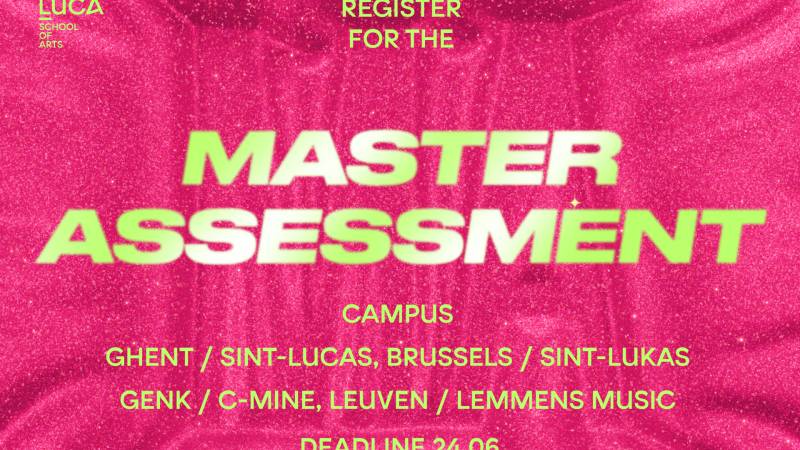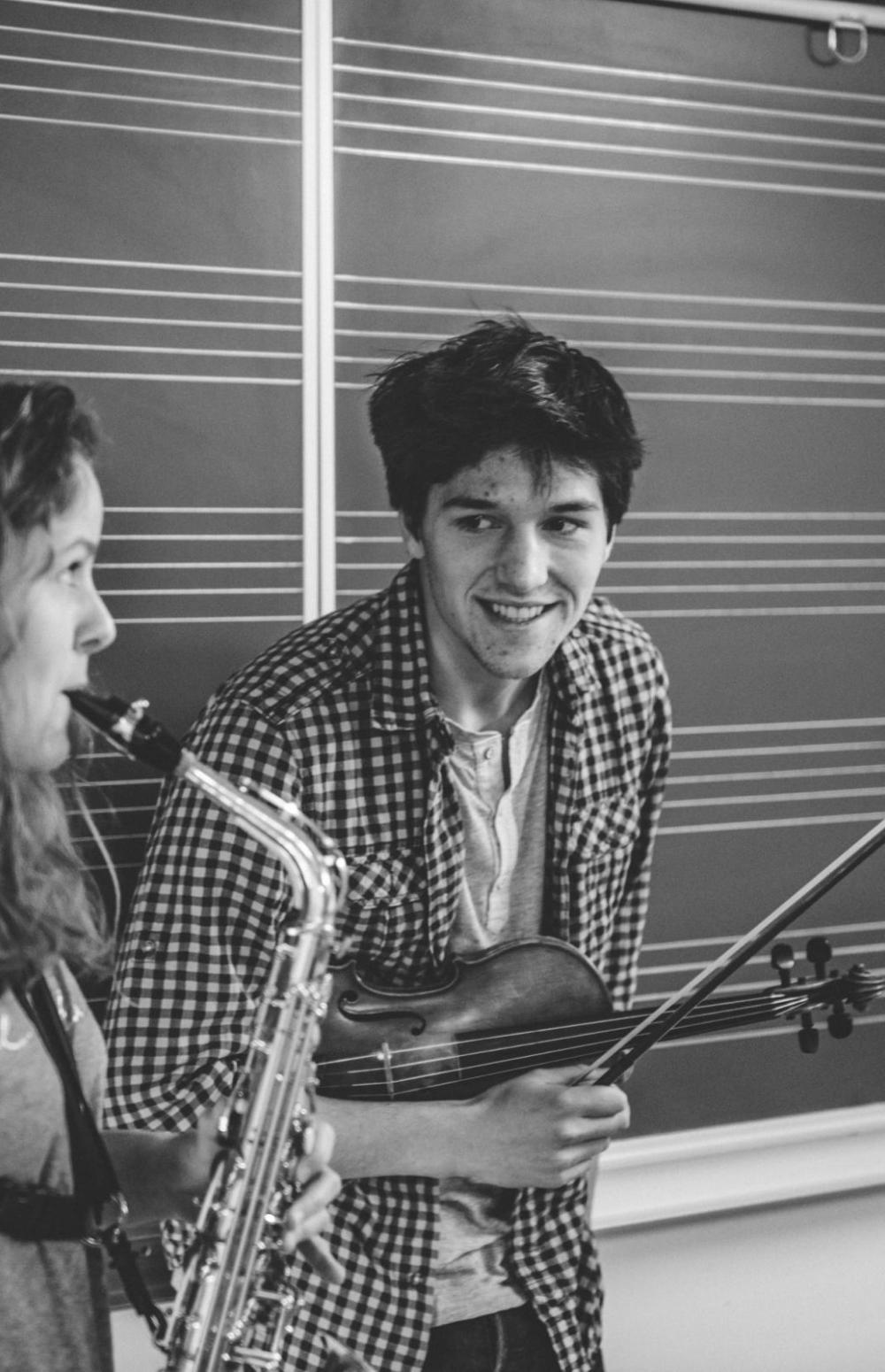
Campus Leuven / Lemmens
Music Pedagogy Exchange
The Bachelor and Master in Music Education challenges you to develop both your musical and educational competencies and become an all-round professional. The program focusses on a broad artistic development, allowing you to focus on different genres, instruments and audiences. Meanwhile, you discover how to use your musical skills in various educational practices with children, youngsters and adults. Your educational thinking and practice go hand in hand with critical (self-)reflection.
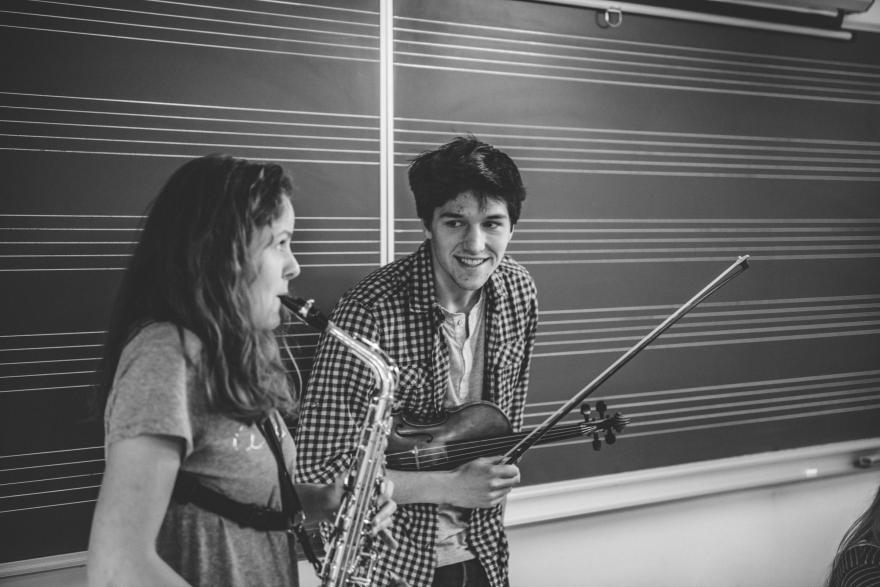
During your Erasmus exchange, courses from all stages of the music education program can be added to your study program. Based on your personal profile, we will put together a coherent course package matching your background, level and interests.
First Semester:
|
Component code |
Course name | ECTS credits |
|---|---|---|
| L43082 | Elective Internship | 3 |
| L43084 | Choir | 3 |
| L43087 | Ensembles/Improvisation | 3 |
| to be updated | Ensembles/Improvisation | 6 |
| to be updated | Instrument (limited places) | 6 |
| L43074 | Composition and Arrangement | 3 |
| L43075 | Composition and Composing Techniques | 3 |
| to be updated | Observational Educational Internship | 3 |
| L43081 | Eartraining - Rhythm - Harmony | 6 |
| L43356 | Professional Toolkit | 3 |
| L43189 | 1MA Atelier New Music | 6 |
| L43186 | 1MA Atelier Folk Music | 6 |
| L43102 | Singer Songwriter (limited places) | 3 |
| Total per semester |
30 |
Second Semester:
| Component code | Course name | ECTS credits |
|---|---|---|
| to be updated | Elective internship | 3 |
| L43364 | Choir | 3 |
| to be updated | Ensembles/ Improvisation | 3 |
| L43398 | Ensembles/ Improvisation | 6 |
| to be updated | Instrument (limited places) | 6 |
| to be updated | Composition and Arrangement | 3 |
| to be updated | Composition and Composing Techniques | 3 |
| L43399 | Observational Educational Internship | 3 |
| L42986 | Issues in Music Education | 3 |
| L42758 | CrossLab 1 | 3 |
| L43114 | Eartraining- Rhythm - Harmony | 6 |
| L43188 | 1MA Atelier Early Music | 6 |
| L43190 | 1MA Atelier Scenic Awareness for Singers | 6 |
| L43354 | Professional Toolkit | 3 |
| Total per semester | 30 |
NOTE: Keep in mind, this page is not definitive, changes might still occur.
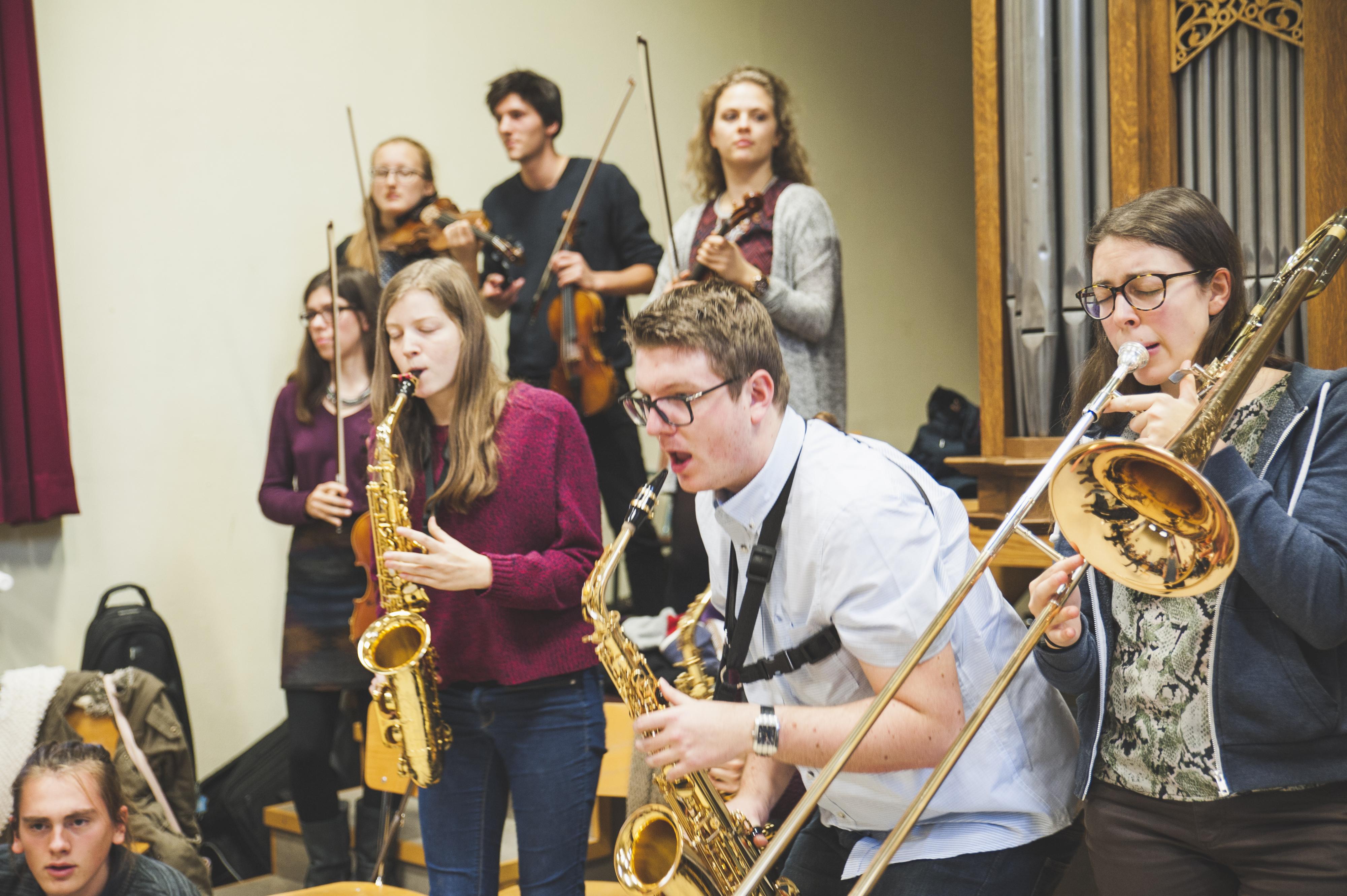
MASTER CLASSES, SYMPOSIA AND INTENSE PRACTICAL EXPERIENCE
A master class with a top instrumentalist, workshops in which internationally renowned music educators enter into dialogue with our students ... Each year, the study programme organises numerous activities. These bring you into contact with experts from outside the university college.
Foreign music teachers are often guests. In recent years, these have included Thade Buchborn (Freiburg, Germany), Martin Fautley (Birmingham, UK), John Feierabend (Harthord, US), Doug Goodkin (San Francisco, US), Lee Higgins (York, UK), Anna Houmann (Malmö, Sweden), Isolde Malmberg (Rostock, Germany), Susan O'Neill (Vancouver, Canada), Gerhard Sammer (Würzburg, Germany), Nina Stern (New York, US) en Adri de Vugt (Den Haag, The Netherlands).
The practice of music is central to your life on our campus. You do not only make music during your practical lessons or self-study, but we also encourage you to participate as much as possible in the performances in our ensembles, choirs and orchestras. Finally, you will also participate in prestigious artistic productions.
A good command of English (level B2) is required to make the most of your stay with us. Campus Lemmens does not own student accommodation. Therefore, you will have to rent a room on the private housing market for the duration of your stay. To help you in your search, please visit to the website of the KUL or contact our student support services.
Interested in this course?
All Erasmus+ Exchange Students need to apply via the exchange application procedure of LUCA School of Arts. During your application process, you can indicate the LUCA campus of your choice and the exchange programme you wish to apply for. Notice that not all programmes are open for incoming exchange students in both semesters. An overview can be found here.
- The deadline for the Autumn Semester / full year is April 1
- The deadline for the Spring Semester is October 1
Outcome Exchange Application
The outcome of the application can be expected within 4-6 weeks after the application deadline. Both you and your international coordinator will be informed about the result of your application by e-mail. No need to inquire about the outcome yourself.
Where do you have class?
Facilities & campus life
- Our very own campus, situated in a parc in one of Europe's oldest university towns
- An artistic meeting space for theater maker and musicians
- A coworking space with rehearsal studio's concert halls and theater venues
- An art centre with concerts, performances and theater shows, lectures and artist talks, book launches, graduation shows and showcases
- An expertise centre for young perfomnce artists with an art library, production support and a lending service
- An intricate network of cultural partners where students rehears and show the results of their projects
Location
Lemmensberg 3
3000 Leuven
info.lemmens@luca-arts.be
+32 2 447 15 00
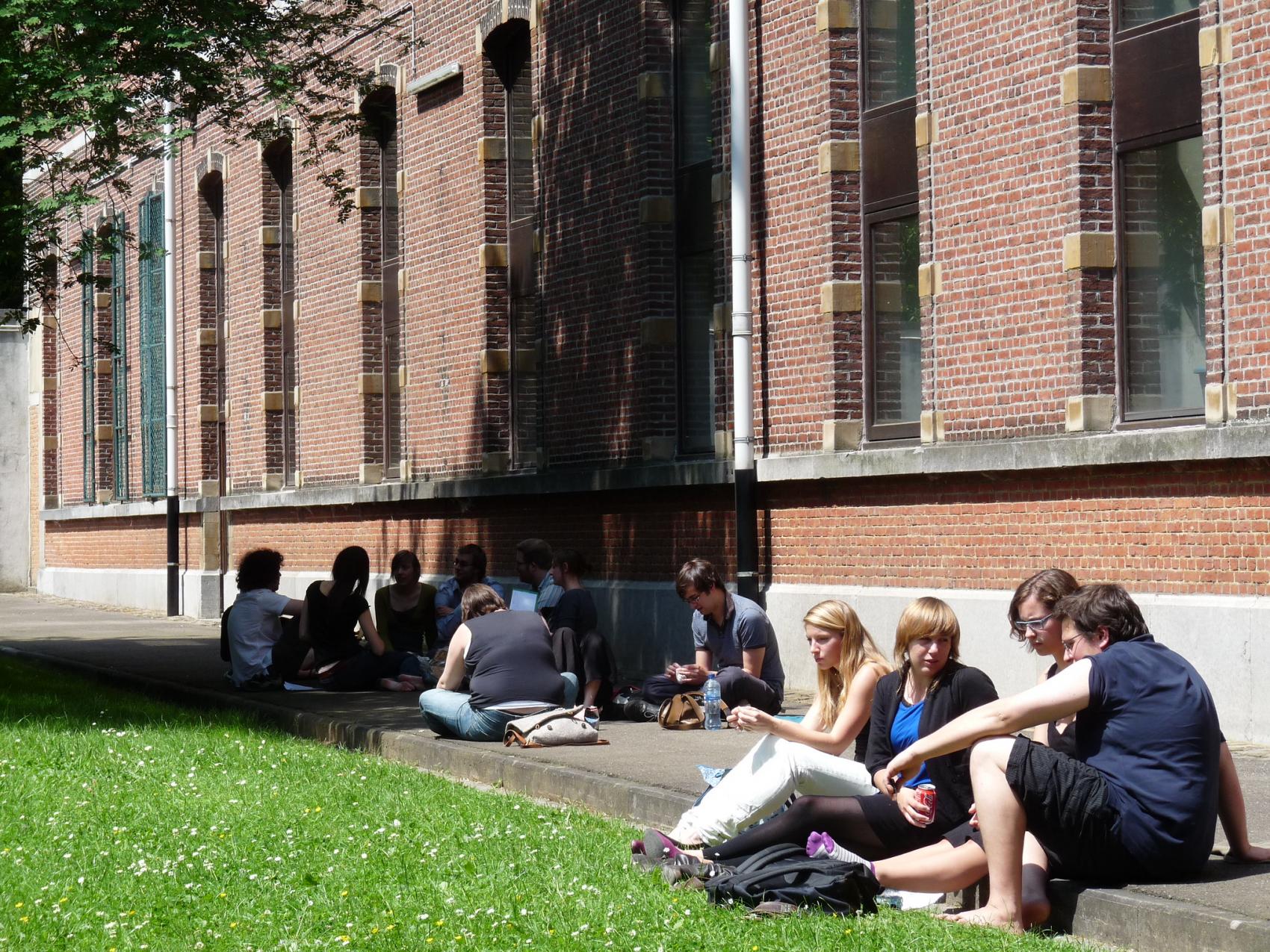
Contact
If you need more information, don't hesitate to contact us:
International Coordinator Campus Lemmens
Diana Solomonidou
diana.solomonidou@luca-arts.be
Campus Lemmens
Lemmensberg 3
3000 Leuven
+32 2 447 15 00
info.lemmens@luca-arts.be
At LUCA we attach great importance to the quality of our courses
If the basic principle of the policy plan means that 'quality is our driving force', and that every aspect of the policy can be tested against this, then LUCA undeniably wants to develop and nurture a strong quality culture: a culture that leaves based on trust in people with talent and expertise, and which is aimed at valuing, inspiring and improving.
The formal quality framework for training within LUCA was named KOPERA, which stands for: Critically Analyzing the Quality of Training with Peers in Own Direction.
For KOPERA, LUCA starts from a vision of quality care that is based on trust and aimed at valuing, inspiring and improving.
During the six-year KOPERA cycle, each training course receives a panel of critical friends who examine the implementation of the quality characteristics and examine how the training contributes to the general LUCA policy.
The final element of KOPERA is the ultimate assurance of training quality. The key question is: "Does the program have a good quality culture that follows the 'plan-do-check-act' circle?"
LUCA publishes a quality sheet for each course. You can find this on the Education Quality page.

